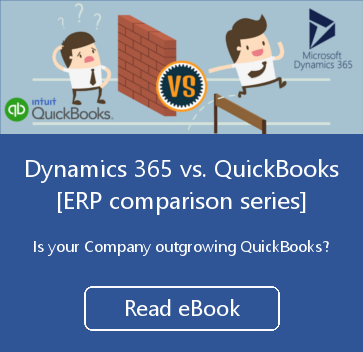What is Dynamics 365 Business Central?
Dynamics 365 Business Central Definition
Dynamics 365 Business Central is an Enterprise Resource Planning (ERP) used to modernizing your business operations across finance, manufacturing, and supply chain to drive new growth. Dynamics 365 Business Central is designed for businesses looking for an all-in-one business management solution that’s easy to use and adapt. Connect your finances, sales, service, and operations to streamline business processes, improve customer interactions, and enable growth.
Microsoft Dynamics 365 & Business Central
What is the difference between Dynamics 365 and Business Central?
 Microsoft Dynamics 365 refers to a family of integrated business solutions that addresses each business functions a company can have, from finance to human resource or marketing functions. Dynamics 365 Business Central is the ERP (Enterprise Resource Planning) solution of this family and addresses the financial functions of the business.
Microsoft Dynamics 365 refers to a family of integrated business solutions that addresses each business functions a company can have, from finance to human resource or marketing functions. Dynamics 365 Business Central is the ERP (Enterprise Resource Planning) solution of this family and addresses the financial functions of the business.
What is included in dynamics 365 Business Central?
Dynamics 365 Business Central is a modern Enterprise Resource Planning (ERP) business solution that allows small and medium sized business to manage their processes. These processes include finance management, sales management, supply chain management, project management, service management, warehouse management and manufacturing.
These features enable businesses to streamline their processes, improve productivity, enhance customer interactions, gain better financial control, and make data-driven decisions using Dynamics 365 Business Central.
FAQs and Helpful Information for Dynamics 365 Business Central
What are the deployment options available for implementing Microsoft Business Central in a business environment?
Microsoft Business Central deployment options include:
- Cloud-based deployment: Microsoft Azure may host Microsoft Business Central. It’s flexible, scalable, and cheap. Businesses can access Business Central from any internet connection.
- On-Premises Deployment: The company’s servers and infrastructure host Business Central’s software and data. This solution gives organizations full data and customisation control.
- Hybrid Deployment: Businesses can use both cloud-based and on-premises components. Companies can use the cloud while keeping sensitive data on-premises for security or compliance.
- Microsoft partners host Business Central. The partner hosts and controls the infrastructure, and businesses access Business Central remotely. Outsourcing Business Central management and maintenance is ideal for this solution.
- Cost, scalability, security, and maintenance vary by deployment method. Businesses should assess their needs and engage professionals to decide the best implementation strategy for Microsoft Business Central.
How does Business Central facilitate financial management and reporting for businesses?
Microsoft Business Central helps firms manage and report finances:
- General Ledger: Business Central’s powerful general ledger helps organizations manage financial transactions. It allows chart of accounts, journal entries, and automated posting. Businesses can track real-time income, expenses, assets, liabilities, and equity.
- Budgeting and Forecasting: Business Central lets companies develop and manage department and project budgets. Businesses can track actual vs budgeted performance, detect discrepancies, and alter future estimates.
- Financial Flow Management: Business Central helps firms track and manage their financial flows. Businesses may track customer and vendor payments, bank reconciliations, and cash flow forecasts. These features assist organizations preserve liquidity by showing their cash situation.
- Compliance and Auditing: Business Central aids financial compliance and auditing. Audit trails, document management, and data encryption protect data. Businesses can prepare audit reports and deliver clear financial information to external stakeholders.
- Integration with Other Systems: Business Central works smoothly with Excel, Power BI, and Office 365. This interface lets firms import/export data, build custom reports, and use advanced analytics for financial management and reporting.
What security measures does Business Central have in place to protect sensitive business data?
Microsoft Business Central safeguards important business data:
- Role-Based Security: Business Central uses role-based security to provide users unique permissions and access rights based on their roles. This prevents unauthorized access to sensitive data and actions.
- Encrypts data at rest and in transit. This protects critical data from unauthorized access.
- Supports multi-factor authentication (MFA). MFA enhances security by forcing users to verify their identity using various factors like passwords, fingerprints, or one-time codes.
- Uses Microsoft’s physically secure data centers. Access controls, surveillance, and redundant infrastructure protect these data centers from unauthorized access, natural catastrophes, and other hazards.
- Automatically backs up and recovers data. This prevents organizations from losing data permanently in the event of data loss or system failure.
How does Business Central support inventory management and supply chain optimization for businesses?
- Inventory Tracking: Business Central makes inventory management easy. Businesses can record item data, set reorder points, and track stock in real time. Inventory can be tracked correctly.
- Lets companies estimate demand using past data and sales trends. It suggests reorder quantities, identifies surplus or shortage situations, and improves inventory planning.
- Automates purchase orders, vendor administration, and invoice tracking. It helps firms avoid stockouts and overstock by replenishing inventory quickly.
- Streamlines order fulfillment and processing. It manages sales orders, inventory, delivery, and order revisions. Order accuracy, lead time, and customer satisfaction improve.
- Streamlines warehouse operations. It supports bin management, selection, packaging, and shipping. It maximizes inventory positioning, order fulfillment, and warehouse accuracy.
- Delivers supply chain analytics and reporting. It provides KPIs, dashboards, and reports to assess inventory turnover, supplier performance, order fulfillment rates, and other crucial supply chain parameters.
RELATED ARTICLES
- Guide to Implement Dynamics 365 Business Central Successfully
- Dynamics 365 Business Central Guide | Pricing, Implementation, Customization
- Dynamics GP and Dynamics 365 Business Central (BC) Licensing Plans?
- How to choose Dynamics 365 Business Central licensing and pricing
- Replace QuickBooks with Dynamics 365 Business Central
- Now you can Replace Your Weak Accounting Software with Dynamics 365 BC
- Top Benefits of Using Dynamics 365 BC for Healthcare Facilities, and Clinics
- Why Migrate from Microsoft Dynamics GP to Dynamics 365 Business Central?
- Using Microsoft Dynamics 365 Business Central to Increase Sales
- Boost Efficiency and Profitability with Dynamics
- Benefits of Using Microsoft Business Central for Government Agencies
- How to Improve Sales, Customer Service and Financial Operations
- How Migrating from Dynamics GP to Dynamics 365 Can Enhance Your Business
- 7 Reasons Why Microsoft NAV Users are Upgrading to Dynamics 365 Business Central
- 5 Myths about Microsoft Dynamics 365 Business Central Busted
- Microsoft Dynamics 365 BC & D365 Sales (CRM) Integration for Manufacturing and Distribution
- Microsoft Dynamics Gp’s Retirement and What Next for Business Enterprises
- Migrating from Microsoft Dynamics GP to Dynamics 365 BC
- To Upgrade or Not to Upgrade Microsoft Dynamics NAV? A Simple Guide
- Upgrade Dynamics NAV to Streamline Your Business for Greater Efficiency
- What is the Future of CRM and ERP Integration?
- Upgrading to Dynamics 365 Business Central: Key Factors to Consider for Dynamics NAV Users
- [Self-Assessment] Dynamics 365 Business Central or Dynamics 365 Finance & Supply Chain Management – Which One Fits Your Business?
- How to Optimize Your Workflow: Tap into the Power of Copilot Chat in Dynamics 365 Business Central
- A Guide to Understanding the Business Central Pricing Plans
RELATED TERMS
EXTERNAL RESOURCES
Ready to approach technology differently and start your Digital Transformation journey?
Since 1987, thousands of organizations have partnered with TMC to rethink their business processes and technology to empower their employees to achieve more, improve customer experience & adapt to the ever-changing global economy.


